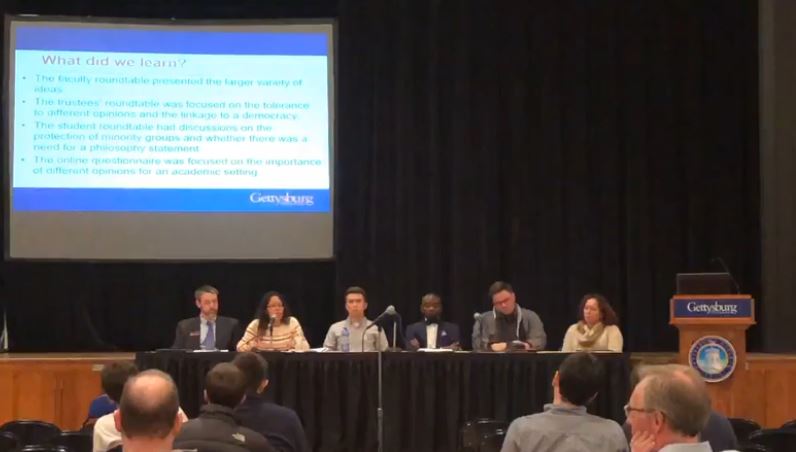Final Version of Freedom of Expression Philosophy Released

Members of the Freedom of Expression Workgroup present at the town hall (Screenshot captured from video by Jamie Welch / The Gettysburgian)
By Benjamin Pontz, Managing News Editor
After a two-week feedback period, the committee charged with drafting a statement of institutional philosophy at Gettysburg released a final version of the statement, which made one change from the original draft.
“After careful consideration of the feedback we received at the town hall and online, the work group made one small (but meaningful) adjustment,” an email sent to the campus community Monday afternoon read. “In the final paragraph of page two, line 6, we deleted ‘or College policies on nondiscrimination.'”
While the statement previously said that the college “may seek to restrict expression that violates state or federal law or College policies on nondiscrimination,” it now says only “may seek to restrict expression that violates state or federal law.”
The committee’s email said that this change came based on feedback from several campus constituencies.
“We found the objections raised by several constituencies regarding some of our college policies to be legitimate and we felt that the removal of the clause would strengthen the philosophy as a whole,” the email read.
Specifically, members of Young Americans for Freedom (YAF) raised the issue at the campus-wide town hall earlier this month.
Among them was Student Senator Nick Arbaugh ’20.
“That’s a big caveat,” Arbaugh said at the time with respect to the nondiscrimination clause, noting that the college is free to write expansive policies on nondiscrimination that could be used to stifle free expression. “To cut at the edges [of freedom of expression] … is grossly irresponsible.”
Bloomquist thanked Arbaugh at the town hall on behalf of the workgroup for his passionate engagement throughout the process and noted, “Diversity and inclusion do not exist at odds with freedom of expression,” going on to say that conservative students are a group whose views need to be considered diverse perspectives along with more traditional conceptualizations of diversity.
While the revision assuaged Arbaugh’s objections about the philosophy, he remains concerned about the college’s posture towards freedom of expression as expressed in existing campus policy including that on harassment.
“I’ll vote for it, though I do that with the intention of applying the statement to seriously challenge existing campus speech regulations,” Arbaugh said of the revised statement. “I’d also like to communicate how hesitant I am to believe that the administration will remain faithful to it, as the character of the statement stands in stark contrast to the character of some of the current policies of the College.”
The statement will now go to Student Senate for discussion and a vote before being sent to faculty and the Board of Trustees. Senate President Luke Frigon added discussion of the statement to the agenda for Monday evening’s Senate meeting late in the afternoon.
Editor-in-Chief Jamie Welch contributed to this report.
